Related Research Articles
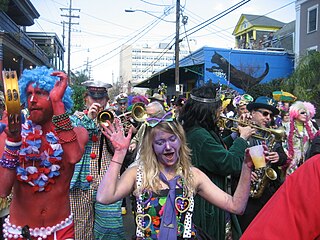
Mardi Gras is the final day of Carnival ; it thus falls on the day before the beginning of Lent on Ash Wednesday. Mardi Gras is French for "Fat Tuesday", reflecting the practice of the last night of consuming rich, fatty foods in preparation for the Christian fasting season of Lent, during which the consumption of such foods is avoided.

Shrove Tuesday is the final day of Shrovetide, marking the end of pre-Lent. Lent begins the following day with Ash Wednesday. Shrove Tuesday is observed in many Christian countries through participating in confession; the ritual burning of the previous year's Holy Week palms; finalizing one's Lenten sacrifice; as well as eating pancakes and other sweets.

Sir Arthur Thomas Quiller-Couch was a British writer who published using the pseudonym Q. Although a prolific novelist, he is remembered mainly for the monumental publication The Oxford Book of English Verse 1250–1900 and for his literary criticism. He influenced many who never met him, including American writer Helene Hanff, author of 84, Charing Cross Road and its sequel, Q's Legacy. His The Oxford Book of English Verse was a favourite of John Mortimer's fictional character Horace Rumpole.

The most famous Furry Dance takes place in Helston, Cornwall, United Kingdom. It is one of the oldest British customs still practised today. The earliest mention seems to be in a letter to the Gentleman's Magazine for 1790 where the writer says "At Helstone, a genteel and populus borough town in Cornwall, it is customary to dedicate the 8th May to revelry. It is called Furry Day". The dance is very well attended every year and people travel from all over the world to see it: Helston Town Band play all the music for the dances.
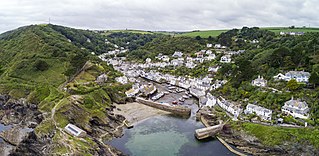
Polperro is a large village, civil parish, and fishing harbour within the Polperro Heritage Coastline in south Cornwall, England, United Kingdom. Its population is around 1,554.

St Just, also known as St Just in Penwith, is a town and civil parish in the Penwith district of Cornwall, England, United Kingdom. It lies along the B3306 road which connects St Ives to the A30 road. The parish encompasses the town of St Just and the nearby settlements of Trewellard, Pendeen and Kelynack: it is bounded by the parishes of Morvah to the north-east, Sancreed and Madron to the east, St Buryan and Sennen to the south and by the sea in the west. The parish consists of 7,622 acres (3,085 ha) of land, 12 acres (4.9 ha) of water and 117 acres (47.3 ha) of foreshore. The town of St Just is the most westerly town in mainland Britain and is situated approximately 8 miles (13 km) west of Penzance along the A3071. St Just parish, which includes Pendeen and the surrounding area, has a population of 4,637. An electoral ward of the same name also exists: the population of this ward at the same census was 4,812.
Hurling is an outdoor team game played only in Cornwall, England, played with a small silver ball. While the sport shares its name with the Irish game of hurling, the two sports are completely different.

Sport in Cornwall includes two sports not found elsewhere in the world, except in areas influenced by Cornish culture i.e. the Cornish forms of wrestling and hurling. The sports otherwise most closely associated with Cornwall are rugby union football and surfing.

The culture of Cornwall forms part of the culture of the United Kingdom, but has distinct customs, traditions and peculiarities. Cornwall has many strong local traditions. After many years of decline, Cornish culture has undergone a strong revival, and many groups exist to promote Cornwall's culture and language today.
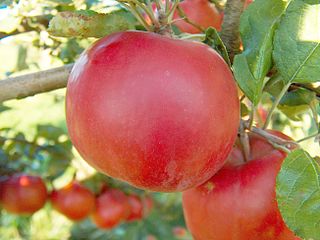
Allantide, also known as Saint Allan's Day or the Feast of Saint Allan, is a Cornish festival that was traditionally celebrated on the night of 31 October, as well as the following day time, and known elsewhere as Allhallowtide. The festival in Cornwall is the liturgical feast day of St Allan, who was the bishop of Quimper in the sixth century. As such, Allantide is also known as Allan Night and Allan Day. The origins of the name Allantide also probably stem from the same sources as Hollantide and Hallowe'en itself.

Shrove Monday is part of the Shrovetide or Carnival observances and celebrations of the week before Lent, following Quinquagesima or Shrove Sunday and preceding Shrove Tuesday or Mardi Gras.
Cornish dance originates from Cornwall, UK. It has largely been shaped by the Cornish people and the industries they worked in. In most cases, particularly with the step dancing, the dances were still being performed across the region when they were collected.
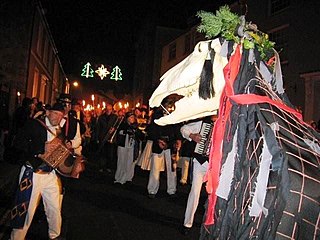
Guise dancing is a form of community mumming practiced during the twelve days of Christmastide, that is, between Christmas Day and Twelfth Night in West Cornwall, England, UK. Today, guise dancing has been appropriated for feast days at other times of the year.
Margaret Ann Courtney was a Cornish poet and folklorist based in Penzance, Cornwall.
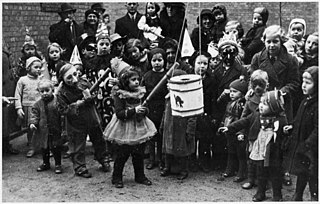
Fastelavn is a Carnival tradition in the Northern European, and historically Lutheran, nations of Denmark, Norway, Sweden, Latvia, Estonia, Iceland, Faroe Islands, as well as Greenland.

Cornish mythology is the folk tradition and mythology of the Cornish people. It consists partly of folk traditions developed in Cornwall and partly of traditions developed by Britons elsewhere before the end of the first millennium, often shared with those of the Breton and Welsh peoples. Some of this contains remnants of the mythology of pre-Christian Britain.
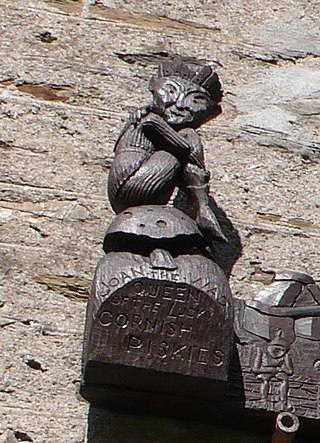
Joan the Wad is a mythological character in Cornish folklore. She is the Queen of the Pixies, which are tiny mythical creatures usually associated with the counties of Cornwall and Devon in England.
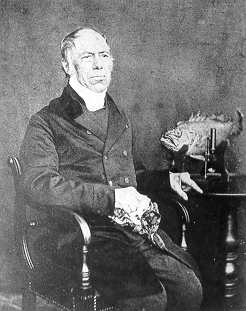
Jonathan Couch was a British naturalist, the only child of Richard and Philippa Couch, of a family long resident at Polperro, a small fishing village between Looe and Fowey, on the south coast of Cornwall. A blue plaque on the wall of Warren cottage commemorates his birthplace.

Slavic carnivals are known under different names in various Slavic countries: Bulgarian: Сирни заговезни, Прошка, Поклади, romanized: Sirni zagovezni, Proshka, Pokladi; Macedonian: Прочка, romanized: Pročka; Russian: Масленица, Мясопуст, romanized: Maslenitsa, Myasopust; Polish: Ostatki, Mięsopust, Zapusty; Czech: Masopust, Šibřinky, Ostatky; Slovak: Fašiangy; Slovene: Mesopȗst, Pust, Pustni teden, Fašnk; Serbian: Покладе, Проћка / Poklade, Proćka; Croatian: Pust, Poklade, Mesopust, Fašnik. They are traditional Slavic festivals related to the period of carnival.
References
- ↑ MA Courtney Cornish feast and feasten cutoms
- ↑ The Cornish Traditional Year - Simon Reed; 2009.
- ↑ Notes and Queries. Oxford University Press. 1855.
- ↑ Hunt, Robert Popular Romances of the West of England
- ↑ The Cornish Year (a 19th-century booklet held by Penzance Library)
- ↑ Courtney. M. A. Cornish Feasts and Feasten Customs
